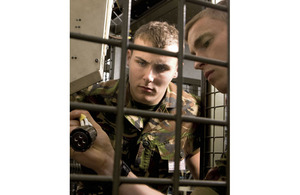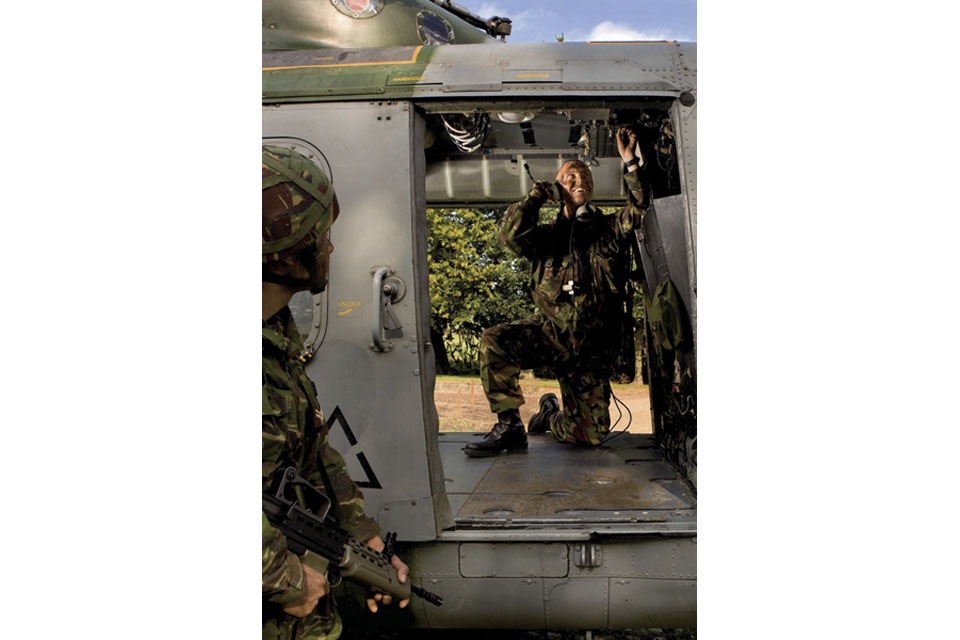Training the engineers who maintain front line equipment
At the Corps of Royal Electrical and Mechanical Engineers' 11 Training Battalion, young engineers are trained to ensure that the equipment troops are using in Helmand is maintained to the highest standards

Craftsmen work on a mock-up of a Challenger 2 battle tank wiring system [Picture: Mike Weston, Crown Copyright/MOD 2010]
Demands for fully-functioning kit and equipment are part and parcel of everyday Army life as the operational tempo in Afghanistan continues.
Providing the hardware for troops in the heart of Helmand is one thing, but ensuring it is maintained to the impeccable standards required by the Service is another.
The Corps of Royal Electrical and Mechanical Engineers (REME) plays a key role in such a vital task and for young soldiers joining this skilled arm of the military the training is thorough to say the least.
Craftsmen are put through their paces at 11 Training Battalion REME in Arborfield, an institution that is barely a year old having emerged from the shadows of the School of Electrical and Aeronautical Engineering.
The site teaches various technician trades and soldiers can spend up to two years learning the skills and drills they need for their chosen career path.
A raft of changes have been introduced at Arborfield over the past year and Commanding Officer Lieutenant Colonel Ian Gibson explained how every effort is made to ensure personnel are fully proficient in their trade and as soldiers:
Twelve months ago our responsibility was for the welfare of the guys in the unit and we had no responsibility for the technical training,” he said. “But the school was reorganised to give responsibility for the troops and their training to us.
We are now taking a different psychological approach to the training and we are trying to treat this place like a posting. We want to give them a sense of belonging.
We have also tried to rebalance the military element of the training as before there was a greater focus on the technical aspect.
We try and make sure that for the two years they are with us they maintain the skills from Phase One and when they leave to join their units they are fit for further military training.

A Craftsman works inside a Lynx helicopter during a fault-finding exercise [Picture: Mike Weston, Crown Copyright/MOD 2010]
Lt Col Gibson described how the courses have clear military, technical and command targets that give soldiers an opportunity to progress in their careers.
While the battalion’s charges join as privates, the officer explained that the aspiration is for every soldier to leave being able to perform to the standard required of a junior non-commissioned officer (NCO):
We make the judgement as to whether they have made the grade as NCOs. That is a big change for the guys coming through here,” he said. “One of the most important things we do is look after them, it is all underpinned by supervisory care.
The best way to look after their needs is to know them. If you understand their normal demeanour and persona you can help them much more.
New arrivals at Arborfield start their training with key skills courses to ensure they meet national standards in literacy and numeracy.
Various foundation, technical, electronics and command courses follow to give personnel the skills they need to work on the Army’s fleet of ground vehicles and aircraft.
Inevitably the work involves intense classroom sessions but there is no shortage of hands-on, practical training such as small-scale projects to create global positioning systems and remote-controlled aircraft, bench work to build part of an airframe, and electrical work on the hull of a tank, and avionics students, who had been living in the field, have also been sent to tackle a serial on a damaged Lynx helicopter:
We get the guys used to working long hours in adverse conditions,” explained Staff Sergeant Graham Lumsdon.
“They are working constantly for three-and-a-half days. We run four-hour serials with minimum downtime. They have to administer themselves, feed themselves, get some sleep and be prepared to move.
This is quite realistic. They are living in tented accommodation and working out in the field, just like they will when on ops.
Craftsman Jack Waterworth explained how the lengthy training cycle has offered clear benefits to his trade and he is now looking forward to putting his new skills to the test:
It is really good,” he said. “It has been a long 22 months but it is training I never thought I would do. They make it as enjoyable as possible and that puts things into perspective.
But Arborfield is not just about delivering a basic education. The facility welcomes back former students who can improve their skills even further on upgrader and artificer courses, training which is conducted to degree standard.
While the site inevitably lends itself to technical-based activities, the battalion ensures personnel enjoy sporting and adventurous training opportunities. They also maintain the military skills needed for Army life.
During our visit, young troops were put through their paces on the basic combat skills course, which teaches them everything from mine awareness techniques to command tasks:
This is a two-week course at the end of the training to enhance their military skills before they are posted to their units,” said training officer Warrant Officer Class 2 Grant Davidson.
It works well. They like being out of the classroom and in the field doing stuff. They thrive on this. We wanted to make it very realistic and up-to-date and my guys have done a lot of research to make sure everything we do is relevant.
The battalion has a clear focus on the work it does and Lt Col Gibson is determined to see soldiers meeting their potential and the needs of the Army. He concluded:
The REME requirement is about supporting equipment capabilities on ops and we are producing soldiers to meet that requirement.